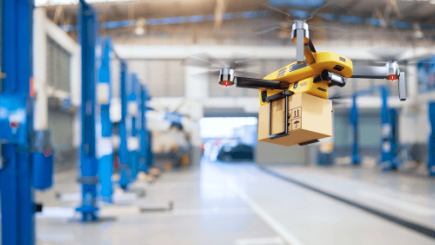
Browse drones courses and programs
Interested in learning how to fly a drone or how to become a drone programmer? Your path to becoming a drone pilot can start by understanding the ins and outs of this technology with a drone class delivered through edX.

What are drones?
Drones are unmanned aerial vehicles (UAV) that are operated remotely or autonomously by onboard computers. There are many different types of drones, such as multirotor drones, fixed-wing drones, single rotor helicopters, VTOL (vertical takeoff and landing) drones, and even autonomous drones.1 Each type of drone is designed for a specific purpose, and can be used in industries ranging from agriculture to the military. Important tasks that drones perform include surveillance, mapping, photography, search-and-rescue operations, and delivery services.
Drones can offer companies, organizations, and individuals many different benefits, such as increased safety, efficiency, cost-effectiveness, and convenience. They can be used to survey hazardous or remote areas without putting people in danger, as well as to inspect infrastructure, such as bridges and buildings, without the need for scaffolding or ladders. They can also be used to capture high-resolution images, allowing for detailed analysis and mapping. And, they can deliver goods to remote locations without the need for additional personnel.
Browse online Drones Certificates
Find new interests and advance your career opportunities
Stand out in your field
Use the knowledge and skills you have gained to drive impact at work and grow your career.
Learn at your own pace
On your computer, tablet or phone, online courses make learning flexible to fit your busy life.
Earn a valuable credential
Showcase your key skills and valuable knowledge.
Certificates
Learn about drone courses and certifications
Learning how to effectively use this technology can now take place from the convenience of your home with an online drone course. edX offers a number of different learning opportunities for individuals interested in studying drones that cover topics such as:
- How to decide whether a drone is useful for a specific mission
- What types of drones can be used for different tasks
- What regulatory requirements must individuals consider when using drones
- How to create and execute a safe mission
- How to understand the data that drones collect
Learners also have the opportunity to delve deeper into drone programming, with coursework that explores the algorithms required to design mobile robots that act autonomously in complex environments. Study topics like environment perception and motion planning that can help build the foundational knowledge for a career working with these useful robots.
Explore drone jobs
Creating a drone can be done at home or can involve a team of people with different skills and backgrounds, depending on the complexity. These can include engineers, designers, computer scientists, aerospace experts, and software developers.The team may also need support from mechanical and electrical engineers, as well as technicians and fabricators. Those interested in pursuing one of the careers that help in the development of drones should research the requirements of working in the specific field. Many of the roles listed require higher level learning that can be obtained through a bachelor’s degree or master’s degree. However, learners may also find that a boot camp provides the necessary level of instruction on a more specialized topic.
Additionally, many professionals who utilize this technology do not need a background in development or programming. They may find that a drone training or tutorial that covers how to operate the tool is sufficient for their purposes. Job roles that may require operation of drones include:
- Professional drone pilots: fly unmanned aerial vehicles (UAVs) for commercial purposes, such as videography, surveying land, mapping, inspections, and monitoring.
- Aerial photographers: capture stunning aerial photography for real estate, weddings, events, and other occasions.
- Agricultural workers: monitor crops and livestock, map out land, and apply fertilizers and pesticides.
- Package delivery operators: deliver packages to customers quickly and efficiently.
- Search and rescue personnel: locate people in need of assistance, such as lost hikers or victims of natural disasters.
- Law enforcement officers: monitor suspicious activity, survey crime scenes, and investigate accidents.
- Filmmakers: capture aerial shots for films, television shows, and music videos.
- Engineers: inspect infrastructure, such as bridges, power lines, and buildings, as well as to monitor construction sites.
- Service members: use military drones to monitor enemy activities, identify and pinpoint targets for combat operations, and relay intelligence information to commanders.
How to learn drone programming and piloting
Developing a drone can require knowledge about a number of different topics, including:
- Electronics and electrical engineering
- Coding languages such as Python or C++
- Aeronautical engineering and physics
- Sensors and control systems
- Communication protocols and systems
- Drone hardware and software
- Navigational systems and GPS
- Troubleshooting techniques for software and hardware issues
- Safety protocols and regulations
Learners interested in studying these fields should explore the suite of offerings that edX provides, which include degree programs such as a bachelor’s degree in data science or a master’s degree in data science, as well as shorter, more specialized learning opportunities such as boot camps in coding.
More opportunities for you to learn
We've added 500+ learning opportunities to create one of the world's most comprehensive free-to-degree online learning platforms.
Frequently Asked Questions
Different Types of Drones and Uses. (2022). JOUAV. Retrieved January 12, 2023.